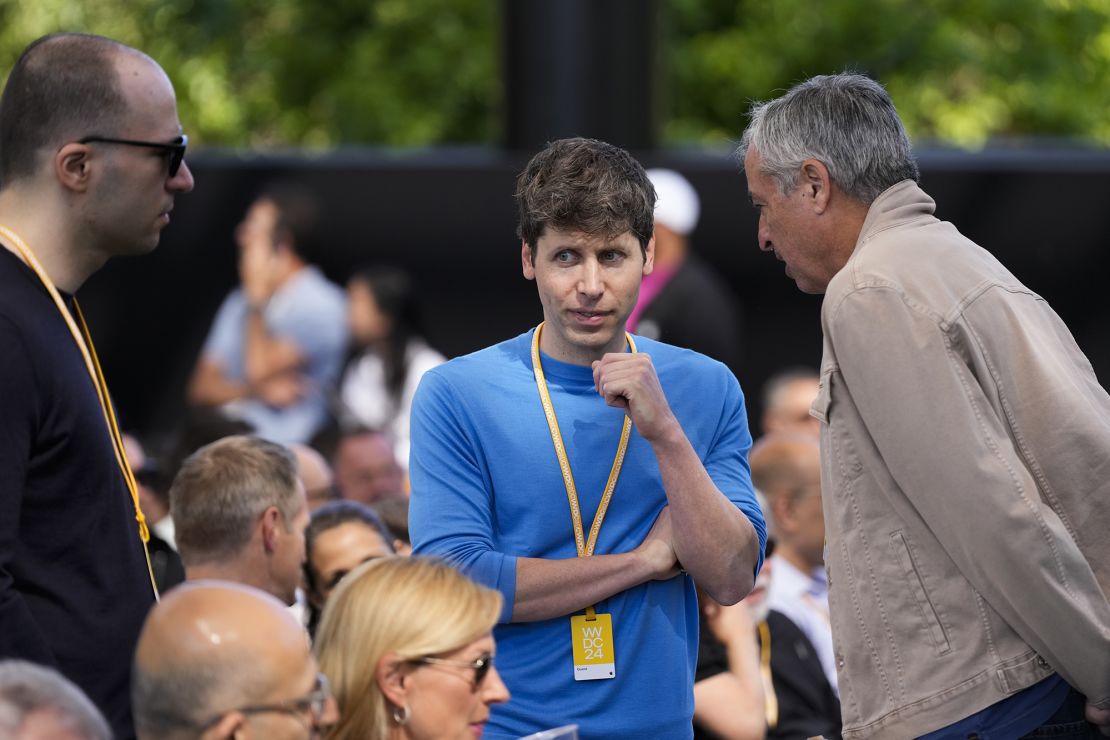(L-R) Apple CEO Tim Cook; OpenAI CEO Sam Altman. Justin Sullivan/Chris Tuite/AFP/Getty Images
CNN —
When OpenAI CEO Sam Altman attended Apple’s annual developer conference this week, he walked the campus, mingling with current and former executives, including Apple co-founder Steve Wozniak. Nearly an hour later, the iPhone maker announced a much-rumored partnership with OpenAI to bring its ChatGPT technology to devices later this year.
But Altman, who has emerged as the poster child for generative AI in the 18 months since the launch of ChatGPT, was not featured in Apple’s formal presentation, neither in person or via livestream. Nor did he join Apple CEO Tim Cook and other executives in a private press event about privacy and security and the partnership between the two companies.
“I was not surprised Sam Altman did not appear on stage,” said Ben Wood, an analyst at market research firm CCS Insight in an interview with CNN. “Apple had to manage the message carefully. OpenAI is merely the vehicle to address broader AI-powered inquiries that are not core to the Apple experience. Having him in the livestream would have only created an unnecessary level of confusion.”
Earlier this week, Apple showed off a handful of AI-powered features coming to the iPhone, iPad and Mac in the fall – the majority of which are fueled by the company’s own proprietary technology, called Apple Intelligence.
The company will offer OpenAI’s viral ChatGPT tool in a limited capacity, usually only when Siri is activated and needs more assistance answering an inquiry.
The move to invite Altman to the announcement but not have him appear before the public also represents in some ways how Apple is cautiously moving forward with the partnership. OpenAI, along with other AI companies, continues to face concerns from researchers, industry experts and government officials around misinformation, biases, copyright, privacy and security, and more. The deal also comes at a time when the industry is moving quickly, and government regulators, companies and consumers are still figuring out how to engage with the technology responsibly.
Apple hopes that a big push into AI could spur growth for iPhone sales as the device has languished without a major upgrade for years and users are now waiting longer to upgrade their devices as a result. An uncertain economic environment is also weighing on consumers, particularly in China.
Tim Cook is on a charm offensive in China to revive flagging iPhone sales
The company also faces regulatory scrutiny in Washington and was recently passed by chip maker Nvidia as the second-largest public company in the US. In the 60 hours after Apple’s Monday event, however, the company’s stock price (AAPL) rose by as much as 10%, boosting Apple’s market capitalization by more than $300 billion, rocketing past Nvidia and putting Apple back in contention with Microsoft for largest market value.
The timing is further noteworthy: Apple is not always first to adopt and integrate emerging technologies — it typically researches, develops and aims to perfect new tech for years before including it in new products — but the speed at which the world is adopting generative AI is perhaps expediting the company’s need to have a smartphone with the latest buzzy technology.
“Apple needed to deliver an AI story and Apple Intelligence should help placate nervous investors and reassure them that Apple is keeping pace with its rivals,” Wood added. “The partnership with ChatGPT is a major development which beefs up Apple’s AI offerings, and new features like a significantly improved Siri will be welcome to users.”
But the partnership could also open Apple up to some vulnerability, as it has no control over OpenAI’s models or what it does with user inputs. Apple alignment with a company and a technology that have yet to win public trust could also cause some challenges down the road.

OpenAI CEO Sam Altman, center, attends an Apple event in Cupertino, Calif., Monday, June 10, 2024. Jeff Chiu/AP
A limited partnership
Although Apple has been working on its own AI program for years, a partnership with OpenAI marks a way for it to fill in the competitive gaps.
When a user has a question beyond Siri’s scope, ChatGPT can step in. In the demo following the keynote, Apple showed CNN how someone could upload a picture of vegetables at a farmer’s market and ask what they could make for dinner. Siri may suggest that the question is better suited for ChatGPT, and provide the user with a prompt to give consent to use the service.
Apple using ChatGPT as a complimentary service could potentially cut down on risks associated with the company. It’s also very possible Apple could partner with other AI companies in the future too, such as Google’s Gemini or more niche providers with certain expertise, such as in healthcare.
“I think Apple will take a pragmatic approach to the OpenAI partnership,” Wood said. “If Apple finds that the relationship with OpenAI starts to affect the overall user experience or worse, create challenges around security and data integrity, it might look to add further guardrails, or find other ways to deliver AI-powered content.”
